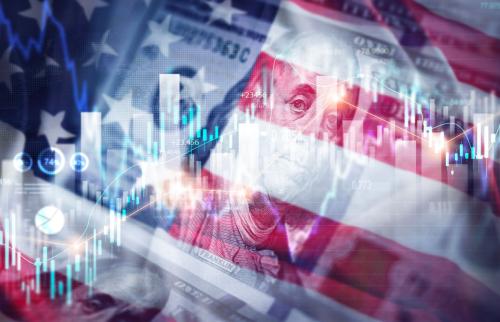The U.S. financial system is careening on the edge of a meltdown. All that has kept the much-vaunted font of global capitalism from sliding into cataclysm is the U.S. government, which has effectively become the guarantor and lender of last resort.
How could things have come to such a pass in a financial system once touted as being the deepest and most sophisticated in the world? Where will it end? What effects will this have on the world financial system? It is difficult to answer these questions with much conviction while we are still in the midst of the crisis. Indeed, every passing day now seems to bring worse news—even weekends no longer provide respite from the steady stream!
Whatever the final outcome, one thing is certain—the rest of the world will no longer be enthusiastic about adopting the free-market principles that guided U.S. financial development. While desperate times may call for desperate measures, massive U.S. government intervention will also make it difficult in the future to make the case that the state should stay out of the workings of the financial system.
No doubt the satisfying emotion of schadenfreude—pleasure at the pain of others—is coursing through the minds of central bankers and policymakers in emerging markets, who for long bore the brunt of U.S. hectoring about free-market principles. They are probably also saying their hosannas for having resisted financial innovations to some degree or another, thanking that for the fact that their economies have not yet been pummeled by the unfolding crisis to as great an extent as the U.S.
Unfortunately, these lessons—if taken literally—may end up being the wrong ones for emerging market economies to be drawing from recent events. Unfortunate because the real lesson to be taken from this crisis is that the abnegation of certain free-market principles may in fact have led to the mess the U.S. now finds itself in. And also because financial development is ultimately going to be important for these economies to sustain high growth rates and allow a broader swath of their populations to participate in and benefit from the development process.
What went wrong in the U.S.? A key problem with Fannie Mae and Freddie Mac, for instance, was that their regulator failed to do its job of uncovering the massive accounting fraud embedded in their books. That and the implicit guarantee of government backing (which finally turned explicit) allowed these two institutions to expand enormously, including into exotic financial transactions that they had no business being involved in.
The roots of the U.S. crisis of course go back to the Greenspan years, when money was easy and regulation was light. The famous ninja (no income, no job and no assets) mortgage loans were as clear a sign of regulatory negligence as any. But these obvious signs of malfeasance were all too easily ignored when times were good and in the face of the current U.S. administration’s hostility towards regulation.
Clearly, financial innovation without effective regulation does not work well. In the new world of more sophisticated financial markets, dangers lurk in hidden places. The present crisis indicates that a set of rigid rules allows resourceful financial institutions to mask riskiness in their portfolios or shift things around to make standard risk metrics appear better than they really are. It is impractical to devise a regulatory framework that accounts for every specific financial instrument and institution. Rather, it makes more sense to develop a “principles-based” framework that can adapt to financial- market evolution and adopts a broader approach to managing systemic risks. Clearly, that was lacking.
The crisis also confirms that some types of government involvement in financial markets—especially through implicit backing of ostensibly “private” institutions—generates bad outcomes that inevitably end up, with taxpayers inevitably footing the bill. The real lessons from the Fannie and Freddie debacle should be about the dangers of implicit government guarantees coupled with moral hazard and weak regulation, and the risks that lurk even in advanced financial systems. These risks are greater in less-developed financial systems, and the costs of cleaning up the resulting messes could also be proportionately larger for poorer economies.
One thing the crisis does show is that fraud, corruption, and government interference can eat away at the foundations of even the deepest financial systems, especially when these problems are compounded by a regulatory system that is too narrow and rule-bound in its outlook and that, at times, turns a blind eye to obvious rot in the system. Now that, at least, is a lesson the emerging markets definitely should take away from the financial crisis.
The Brookings Institution is committed to quality, independence, and impact.
We are supported by a diverse array of funders. In line with our values and policies, each Brookings publication represents the sole views of its author(s).



Commentary
Op-edEmerging Lessons from the U.S. Financial Crisis
September 25, 2008